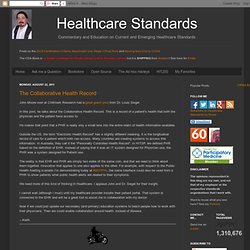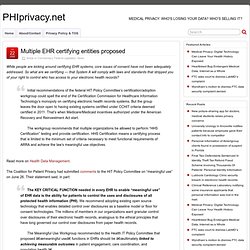

Yes, you do have a right to your health records. Lest anyone forget — including the American Hospital Association, which wants to take 30 days post-discharge to supply copies of medical records to patients — HIPAA explicitly gives patients the right to access their own records.

This is not new. The HIPAA privacy rules have been in force since 2002. Yet, far too many patients have no idea of this right and far too many providers don’t inform patients of this right or do what they can to prevent access. Fortunately, the HHS Office for Civil Rights, which enforces HIPAA privacy and security standards, is trying to change that with an outreach campaign, including this video. Unfortunately, the video has been viewed just 556 times as of this writing.
Various HHS agencies are trying hard to disseminate messages to the public. For that matter — and I mentioned this to one of the AHRQ higher-ups at the HIMSS conference a few months ago — how many people really know what the Agency for Healthcare Research and Quality is? Fight Disassociated Patient Syndrome Today. The Collaborative Health Record.
John Moore over at Chillmark Research had a great guest post from Dr.

Louis Siegel. In this post, he talks about the Collaborative Health Record. This is a record of a patient's health that both the physician and the patient have access to. He makes that point that a PHR is really only a small lens into the entire realm of health information available. Outside the US, the term "Electronic Health Record" has a slightly different meaning. The reality is that EHR and PHR are simply two sides of the same coin, and that we need to think about them together. We need more of this kind of thinking in Healthcare. I cannot wait (although I must) until my healthcare provider installs their patient portal. Now if we could just update our secondary (and primary) education systems to teach people how to work with their physicians. -- Keith.
The fundamental Flaw with the #EMR is it's just Medical and with the #PHR is it's just Personal.
Personal Health Information Privacy » Multiple EHR certifying entities proposed. While people are kicking around certifying EHR systems, core issues of consent have not been adequately addressed.

So what are we certifying — that System A will comply with laws and standards that stripped you of your right to control who has access to your electronic health records? Initial recommendations of the federal HIT Policy Committee’s certification/adoption workgroup could spell the end of the Certification Commission for Healthcare Information Technology’s monopoly on certifying electronic health records systems. But the group leaves the door open to having existing systems certified under CCHIT criteria deemed certified in 2011. That’s when Medicare/Medicaid incentives authorized under the American Recovery and Reinvestment Act start.The workgroup recommends that multiple organizations be allowed to perform “HHS Certification” testing and provide certification.
Read more on Health Data Management. Deborah Peel, M.D., founder of PatientPrivacyRights.org, had this to say: OSUMC Center for IT Innovations in Healthcare - Monday 17-Nov-08 8:00 AM at Hilton Easton. A calendar event on TechColumbus. From Ted Eytan’s blog: “Now Reading: Patients actually want their entire medical record” An important study just got my attention. Patients and clinicians in different cities were asked questions about concerns and preferences. Titled “Insights for Internists: ‘I Want the Computer to Know Who I Am’,” the study reports: (emphasis added) Patients do keep their own medical recordsThey want access to everything in their recordPrivacy worries “appeared to fade rapidly in the face of the desire to have records fully available in emergency settings and with multiple and new providers” “health professionals professed far more concern about maintaining privacy than patients.”They understand that their clinicians are busy/stressed, they want the information to supplement and make their (clinicians) work more efficient, not less Boy do I wish we’d all known about this during the debates about meaningful use and medical records this summer!
And here’s the thing: it was published back in May, and the research was done THREE YEARS AGO, Nov. 2006 to Jan. 2007.